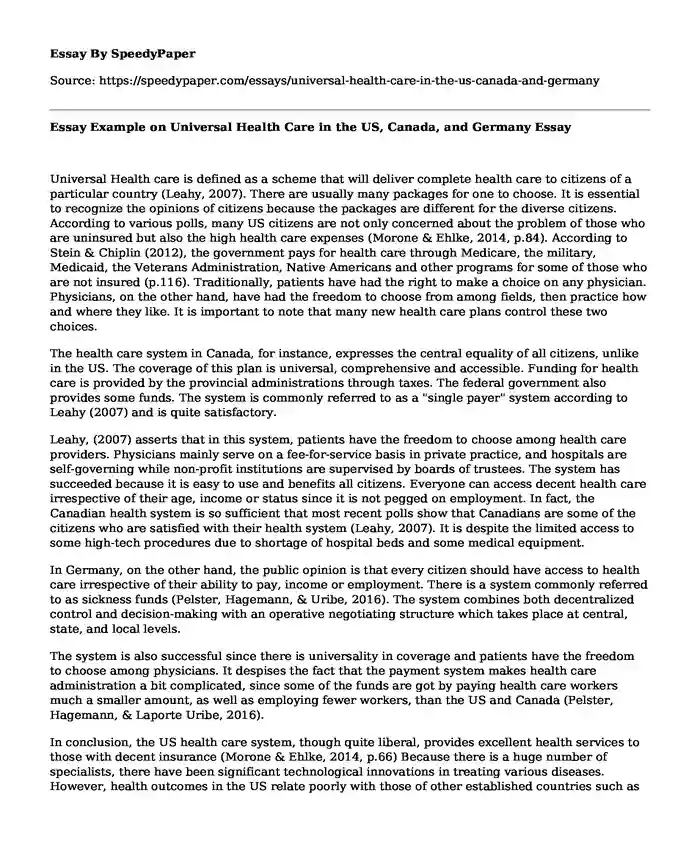
| Type of paper: | Essay |
| Categories: | Health and Social Care United States |
| Pages: | 3 |
| Wordcount: | 673 words |
Universal Health care is defined as a scheme that will deliver complete health care to citizens of a particular country (Leahy, 2007). There are usually many packages for one to choose. It is essential to recognize the opinions of citizens because the packages are different for the diverse citizens. According to various polls, many US citizens are not only concerned about the problem of those who are uninsured but also the high health care expenses (Morone & Ehlke, 2014, p.84). According to Stein & Chiplin (2012), the government pays for health care through Medicare, the military, Medicaid, the Veterans Administration, Native Americans and other programs for some of those who are not insured (p.116). Traditionally, patients have had the right to make a choice on any physician. Physicians, on the other hand, have had the freedom to choose from among fields, then practice how and where they like. It is important to note that many new health care plans control these two choices.
The health care system in Canada, for instance, expresses the central equality of all citizens, unlike in the US. The coverage of this plan is universal, comprehensive and accessible. Funding for health care is provided by the provincial administrations through taxes. The federal government also provides some funds. The system is commonly referred to as a "single payer" system according to Leahy (2007) and is quite satisfactory.
Leahy, (2007) asserts that in this system, patients have the freedom to choose among health care providers. Physicians mainly serve on a fee-for-service basis in private practice, and hospitals are self-governing while non-profit institutions are supervised by boards of trustees. The system has succeeded because it is easy to use and benefits all citizens. Everyone can access decent health care irrespective of their age, income or status since it is not pegged on employment. In fact, the Canadian health system is so sufficient that most recent polls show that Canadians are some of the citizens who are satisfied with their health system (Leahy, 2007). It is despite the limited access to some high-tech procedures due to shortage of hospital beds and some medical equipment.
In Germany, on the other hand, the public opinion is that every citizen should have access to health care irrespective of their ability to pay, income or employment. There is a system commonly referred to as sickness funds (Pelster, Hagemann, & Uribe, 2016). The system combines both decentralized control and decision-making with an operative negotiating structure which takes place at central, state, and local levels.
The system is also successful since there is universality in coverage and patients have the freedom to choose among physicians. It despises the fact that the payment system makes health care administration a bit complicated, since some of the funds are got by paying health care workers much a smaller amount, as well as employing fewer workers, than the US and Canada (Pelster, Hagemann, & Laporte Uribe, 2016).
In conclusion, the US health care system, though quite liberal, provides excellent health services to those with decent insurance (Morone & Ehlke, 2014, p.66) Because there is a huge number of specialists, there have been significant technological innovations in treating various diseases. However, health outcomes in the US relate poorly with those of other established countries such as Canada and Germany. It may be attributed to the failure of the health care system in the US. Practical steps must, therefore, be taken to ensure that the system is improved for the benefit of all citizens.
References
Leahy, J. (2007). Access to Care, Health Status, and Health Disparities in the United States and Canada: Results of a Cross-National Population-Based Survey. Yearbook of Endocrinology, 2007, 42-43. http://dx.doi.org/10.1016/s0084-3741(08)70028-3
Morone, J. & Ehlke, D. C. (Editors). (2014). Health Politics and Policy (5th edition). Clifton Park, NY: Delmar, Cengage Learning
Pelster, M., Hagemann, V., & Laporte Uribe, F. (2016). Key Aspects of a Sustainable Health Insurance System in Germany. Applied Health Economics and Health Policy, 14(3), 293-312. http://dx.doi.org/10.1007/s40258-016-0223-8
Stein, J. & Chiplin, A. (2012). 2012 Medicare handbook. New York: Wolters Kluwer/Aspen Publishers.
Cite this page
Essay Example on Universal Health Care in the US, Canada, and Germany. (2019, Oct 04). Retrieved from https://speedypaper.net/essays/universal-health-care-in-the-us-canada-and-germany
Request Removal
If you are the original author of this essay and no longer wish to have it published on the SpeedyPaper website, please click below to request its removal:
- Culture and Education - Personal Experience Essay Example
- Thematic Shift in Batman Begins, Movie Essay Sample
- Free Essay with an Analysis of Elbow's "The Believing Game"
- Free Essay on Ethical Issues Surrounding Euthanasia
- Defining Global Education
- Paper Example on Existential Psychology and Logotherapy
- Paper Example. Sexuality and the Elderly
Popular categories




